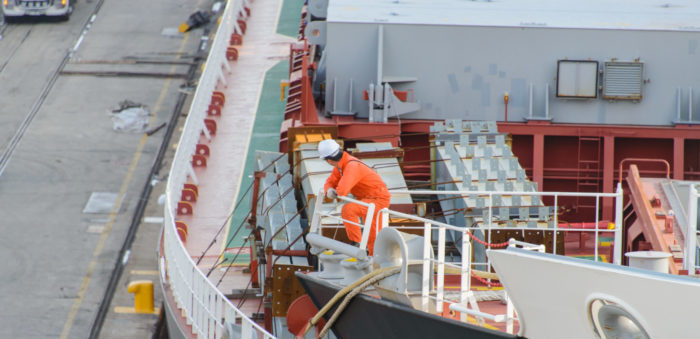Commitment to crew competency is vital for the retention of seafarer’s skill sets and employment, at a time when financial pressure impacts safety. Dr. William H. Moore, Senior Vice President of Loss Prevention, The American P&I Club, discusses about Club’s initiatives for addressing crew competency and assurance and supporting Members in identifying and managing holistic risks to safety from both shore-based management and shipboard operational perspectives.
SAFETY4SEA: What will be the biggest challenges in terms of Loss Prevention up to 2020?
William Moore: Resources to properly train seafarers and crew is the primary concern relevant to safety and a continual focus for the American Club’s loss prevention initiatives. The negative financial effects of the global downturn in trade are still with us today. This is particularly acute for companies that do not have the financial resources to properly train officers and conduct recurrent training. Another result of the financial pressures as well as minimally manned vessels is lack of maintenance.
The impact advancements in technology and seafarers inability to keep up with that technology have also been identified as a key concern. Simply put, technology is outpacing crew competency. This is further exacerbated by the complexity of today’s equipment and machinery as well as the lack of critical spare parts have impacted the incidences of machinery breakdowns and damages.
Technology is outpacing crew competency
Further financial pressure that impacts safety is the cost of compliance with both Ballast Water Management Convention and compliance with Annex VI to the MARPOL 73/78 Convention, Prevention of Air Pollution from Ships. The cost of compliance with these mandatory conventions draws time, resources and significant capital away from implementing safety measures; particularly safety imperative seafarer and crew based training.
S4S: Regarding the claims received from your members last year, which was the major contributor factor for the majority of them? Have you noticed any worrying trends during the last years?
W.M.: The American Club has seen a particular trend in incidences of vessel collisions highlighted recently in the collision between the SANCHI and CF CRYSTAL. The potential catastrophic collisions are clearly a concern for the industry as a whole. Furthermore, we have also seen an increase in the incidence and costs related to STS-related incidents.
There is growing concern regarding the use and overreliance upon ECDIS systems
Slips, trips and falls onboard ship leading to injuries and fatalities have been a concern for the maritime industry since the dawn of maritime trade and an issue the American Club regularly draws our Members’ attention to ensuring safe shipboard operations. We have also seen a growing concern regarding the use and overreliance upon ECDIS systems and their contributing risks to both groundings and collisions.
S4S: With respect to your own Loss prevention initiatives which one tend to me more effective?
W.M.: Historically, the American Club’s Pre-Employment Medical Examination (PEME) program has been the most successful loss prevention initiative that the Club has implemented with a cost savings to our Members in the of approximately US$ 2.25 million per annum since its inception in 2004. This success is solely due to the Club’s Members who have been supportive since the program’s inception.
[smlsubform prepend=”GET THE SAFETY4SEA IN YOUR INBOX!” showname=false emailtxt=”” emailholder=”Enter your email address” showsubmit=true submittxt=”Submit” jsthanks=false thankyou=”Thank you for subscribing to our mailing list”]
In addition, since 2005, the American Club has been in a cooperative agreement with the Subic Bay, Philippines based company, IDESS Interactive Technologies (IDESS IT) building competency assessment and competency assurance e-Learning tools on safety and environmental protection related subjects including bridge management with the pilot onboard, entry into confined spaces, the COLREGS, bulk carrier safety, compliance with MARPOL 73/78. The Club’s commitment to this initiative led to the American Club winning the 2017 Seatrade Award for Investment in People
S4S: How does your Club promote loss prevention across the industry?
W.M.: Since 2003, the American Club has had a devoted and focused loss prevention strategy strongly supported by its Members and its Manager’s senior management. The American Club’s loss prevention focus for 2018 is devoted to more face-to-face interaction with our Members to assist them in integrating the Club’s diverse and focused loss prevention initiatives and programs. A particular focus on providing such services for our American domiciled Members is also underway. Additionally, the American Club is working on a program to assist Members in identifying and managing holistic risks to safety from both shore-based management and shipboard operational perspectives.
S4S: What are your suggestions to industry stakeholders to enhance effectiveness of loss prevention best practices?
W.M.: At the end of the day, loss prevention begins and ends with ensuring seafarer and crew competency. We are pleased to note that the tanker industry, in particular, has stepped up to meet the demands of their charterers in addressing crew competency and assurance and is exemplified by their use of the Club’s e-Learning tools. It is our intention to devote additional time and resources in promoting and assisting our Members carrying non-liner trade dry cargoes.
The views presented hereabove are only those of the author and not necessarily those of SAFETY4SEA and are for information sharing and discussion purposes only.
About William Moore
Dr. Moore is the Senior Vice President for Loss Prevention at the Shipowners Claims Bureau, Inc., managers of the American Club. In that capacity, he brings 22 years of experience to the development and implementation of the Club’s loss prevention initiatives to assist shipowners in the reduction of maritime risks and incidents. He formerly worked at ABS in New York and Gard Services in Norway. He acquired his doctorate degree at the University of California at Berkeley in Naval Architecture & Offshore Engineering and is also a graduate of Ocean Systems Management at the Massachusetts Institute of Technology. Dr. Moore is also formerly the Chairman of the IMO’s Joint Maritime Safety Committee & Marine Environmental Protection Committee’s working group on the Human Element. He is also a Member of the American Bureau of Shipping.































































